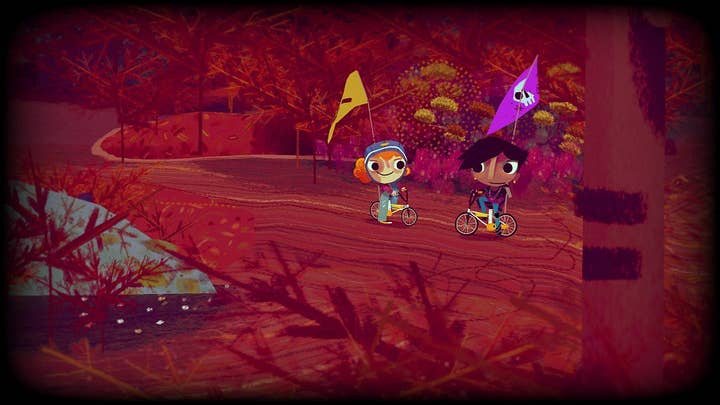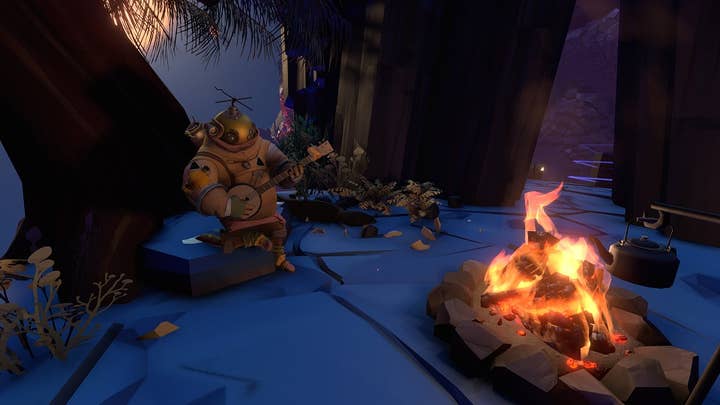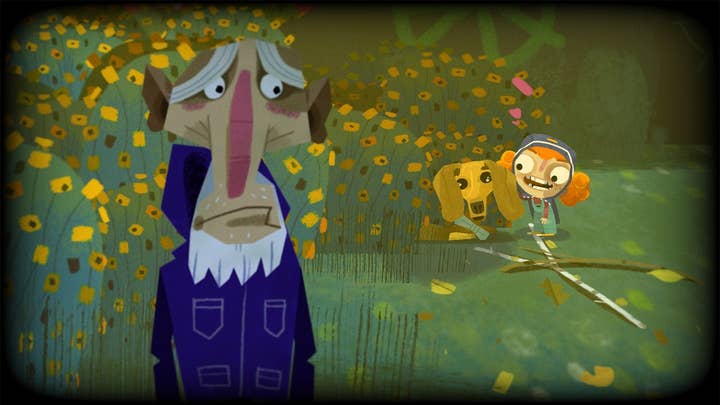"It'd be quite nice to make something that wasn't quite so whimsical"
DLC: What unites LittleBigPlanet and Knights and Bikes, how Masi Oka made the Outer Wilds studio work, and Zynga's belief in a cross-platform future
From time to time, there are interesting bits from GamesIndustry.biz coverage that don't really fit well into the rest of the story, but are still worth reporting. Rather than relegate them to the trash bin of unpublished work, we'd like to repackage them into columns intended to provide additional insight on a variety of topics. While the exact format of these columns is still taking shape, we will publish them under the banner of "DLC."
What Does It All Mean?
Not every creator likes to talk about the meaning and themes behind their creations. It can no doubt feel obnoxious to spell it out in an interview, particularly after you spent years articulating the exact same thing in the medium you felt fit it best and in the way you thought it would be easiest to communicate.
When we spoke with Knights and Bikes designer Rex Crowle at the Montreal International Games Summit last year -- quick disclosure: MIGS paid for our travel and accommodations -- and asked him about the themes and through-lines that connect his work, we did so half-expecting a dismissal or a dodge. Thankfully, he was willing to engage with the question in the spirit it was asked.

"I've gone into a bit of a niche of making a lot of quite... family-friendly-but-with-an-edge kind of games that were charming," he said. "And maybe there's something to remembering those days of climbing trees and swinging around -- kind of like Miyamoto with Zelda. I think I've always wanted to make games about friendship and collaboration, working together, lots of good stuff."
As for the edge he mentions, Crowle said players may not always pick up on it, but games like Tearaway do have some darker themes at work in them.
"To a lot of people, it's a sort of charming world in a papercraft universe," he said, "It's actually inspired by folklore and The Wicker Man -- the original Wicker Man, not the Nicolas Cage abomination -- and things like that."
He added: "There is a dark half of me that really wants to make a punk, almost nihilistic game to get that out of my system. I hate the term 'whimsical,' but people do quite often use the word on things I've worked on. So it'd be quite nice to make something that wasn't quite so whimsical."
"There is a dark half of me that really wants to make a punk, almost nihilistic game to get that out of my system"
Rex Crowle
The day after that interview, we received an email from the PR contact who helped set up the interview with Crowle in the first place. It seemed the question had stuck with him after our chat, and he wanted to explain in a bit more detail. We'll just paste his answer here because it's fascinating on its own.
"Each project you make is probably going to be some kind of reaction to what you made before. LittleBigPlanet was a reaction to what we'd been working on at Lionhead before Media Molecule was formed. And in turn, Tearaway was a bit of a reaction to LittleBigPlanet, because LBP and that pop-culture mash-up style I had developed for that title became so popular, I really wanted to retreat from that aesthetic and make something that was almost the opposite.
"Tearaway was very folky compared to LittleBigPlanet's pop. And the themes in the story were quite earthy in comparison. We took a lot inspiration from old folklore in England, Eastern Europe and North and South America. But particularly those folk stories and traditions surrounding fertility, birth and death. Not what everyone expects or notices that whilst playing this apparently whimsical kids game! But it's all there if you look for it.
"Although that reinvention for Tearaway is probably most obvious in the art style itself, because it was all created from plain-paper, not paper with artwork painted or collaged onto it. Aside from it just having a bold, clean look that allowed the 3D paper forms to [be] shown off best, it was also because I wanted the team to have a style that they could fully express themselves in. I didn't want them having to match my way of painting and drawing in order to make something visually cohesive.

"I once visited one of my favourite contemporary artists at his studio in Barcelona, and it was a huge honour to spend some time with him, but it always stuck with me that he had a huge team all working on replicating his drawing style so that he was able to do many projects at once. It was definitely a successful way of working for him, but not one I wanted for myself. I didn't want to be giving feedback that whatever someone created didn't look enough like I had thought of it; I wanted to be surprised by what team members were creating and encouraging them to take it even further. Because that just feels like a more stimulating way to work, as everyone gets more out of it.
"If there's one continuing theme in everything I've made it's about the importance of the journey, and of soaking up experiences along the way"
Rex Crowle
"And then with Knights and Bikes, well that was a bit of a reaction to becoming the slightly less hands-on director type role on Tearaway, and feeling the need to get my hands dirty again, and improve some of my art and world-building skills. So the art style is the opposite of Tearaway: it's all paint and detail, rather than the untouched paper. There's still some of the folky themes from Tearaway in there, but with a little sprinkling of some pop culture references that I guess are a little more in the style of LittleBigPlanet. It has those mass-market 1980s things that every kid adored like BMX bikes, beat-boxes, mix tapes, and Saturday-morning cartoons, but within the framework of a more emotional, subtle story about family and friendship and the power of holding on to your childhood imagination.
"I think if there's one continuing theme in everything I've made it's about the importance of the journey, and of soaking up experiences along the way. LittleBigPlanet was a collection of the world's creativity and culture collected together to encourage players to reuse all these assets in surprising ways to unlock their own talents. Tearaway was literally about taking yourself to the ends of the Earth, on a journey that shaped your appearance and provided you with a unique story at the end. And Knights and Bikes is about developing a friendship."
Making Hollywood and Games Work
While at MIGS, we also interviewed Loan Verneau of Mobius Digital, a studio probably best known for last year's hit, Outer Wilds. However, for much of its history, Mobius was instead known as the developer founded by Masi Oka, the Emmy- and Golden Globe-nominated actor who played Hiro Nakamura in the TV series Heroes.
There's a long and not-so-storied history of film and TV celebrities getting involved in the games industry and having their projects or studios fall apart before shipping, much less creating something successful. We asked Verneau why Oka's involvement with Mobius worked when so many other celebrity start-ups have floundered. He noted that Oka is "a bit of a Renaissance man," with a history in visual effects and technical knowledge that most actors wouldn't have. On top of that, Verneau stressed that Oka's goal with Mobius was to "create a creative family."
"'Yes, and...' is the 101 of improv. It's interesting once you get to the next step, which is, 'Sometimes you have to make choices.'"
Loan Verneau
"He was really active in the recruitment process, the team-building process, but when it comes to the projects, he really trusts our ability to design the games, to build the games, and to produce the games," Verneau said. "He has a good understanding on how to work creatively; he's really big in the theatrical improv scene. He's done a few lessons with us in the office.
"That's something I personally really like because it builds a way of working, a safe creative environment where you can propose ideas and everybody feels free to give their ideas but also -- we have a saying that sounds terrible -- being ready to kill your babies. There are a million and one ideas, and most of them are not going to end up in the final product, so you have to be free to give your ideas but not getting attached to them too much, which is a good way to work."
We pointed out that killing babies doesn't seem to mesh well with the one bit of improv we're familiar with: "Yes, and...," the idea that it's better to take another person's idea and add your own twist to it than to deny it outright.

"'Yes, and...' is the 101 of improv," Verneau said. "It's interesting once you get to the next step, which is, 'Sometimes you have to make choices.' The 'Yes, and...' is more about how you listen to an idea.
"We care very much about creative direction in the company. The company is structured around the creative director for the game, who has the final creative say. And I think it's very important for us that, in the end, our games feel coherent. It's different for different companies. Some are a lot more into mixing and matching ideas and building things out of that, and it works great. But from our perspective, we like to have something where the message is the same on every level, whether it's the audio, the art, or the gameplay.
"That's why it's important for us to have creative direction that's very strong, but that doesn't mean there's one person giving all the ideas. It just means there's one person at the end of the day that looks at the big picture and says, 'These are the ideas that will serve what we're trying to do, so these are the ones we're using right now.'"
"I don't think you'll see us coming out with a console game any time soon"
Matt Bromberg, Zynga
Is Zynga looking for new platforms?
When Zynga reported its year-end earnings last week, one of the company's highlights of 2019 was the release of Tiny Royale on Snapchat's integrated gaming platform Snap Games. In a short call after the earnings, Zynga COO Matt Bromberg gave GamesIndustry.biz an update on that title's performance since its April debut.
"It's still in the experimental stage at this point," Bromberg acknowledged. "We're proud of the game and it has resonated really well with the Snap audience. But that platform is relatively nascent with respect to its maturity as a game platform. We're going to continue to invest and partner with Snap, but it's still very, very early."
When asked if expanding the platforms it operates on was a big priority, Bromberg said that Zynga is interested in anything that could potentially grow the business.
"New platforms are really important from an industry perspective. If you think about some of these things we've done with Facebook and Snap, these are massive consumer groupings and there's no reason in principle why they shouldn't be game platforms. So we're very interested whenever we see an opportunity to grow the market."
Could that mean a move to the traditional console market? Zynga's games haven't been a fit on such platforms in the past, but recent years have seen console titles adopting plenty of gameplay mechanics and ideas that were tested and proven out in mobile games of the sort Zynga specializes in.
"There's no question that a lot of what made core mobile successful has migrated into the more traditional console business," Bromberg said. "And as a management team, we've spent a lot of time in the console business in our careers, so it's not something that's foreign to us. But by the same token, I don't think you'll see us coming out with a console game any time soon.
"Having said that, we do believe and are intrigued by the cross-platform future. As free-to-play business models rise to the top and consumers show a preference for them -- and things like cloud gaming expand -- I think you'll see platforms and distinctions between platforms begin to get somewhat erased. Over time, consumers will want to play games wherever they are, on whatever device they're on. We really do believe that is a trend in the future.
"While we don't have any plans and won't be making a console game, we are very open in the future to thinking about cross-platform play with some of our larger franchises, and it's something we're doing a lot of work on."

